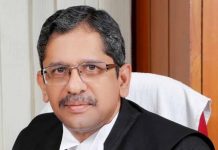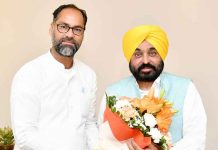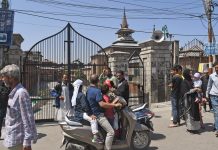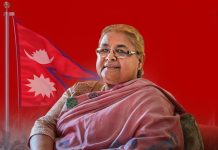 On January 19, the People’s Conference chief In Sajad Gani Lone pulled out of the People’s Alliance for Gupkar Declaration (PAGD), the alliance of Kashmiri parties formed in October last year to demand restoration of Article 370 that granted J&K its semi-autonomous status under India’s constitution. In a letter addressed to the PAGD president Dr Farooq Abdullah, Lone pointed out the fielding of proxy candidates by constituent parties against the officially mandated candidates of the alliance during the recent District Development Council elections. He called it “a breach of trust between the partners”.
On January 19, the People’s Conference chief In Sajad Gani Lone pulled out of the People’s Alliance for Gupkar Declaration (PAGD), the alliance of Kashmiri parties formed in October last year to demand restoration of Article 370 that granted J&K its semi-autonomous status under India’s constitution. In a letter addressed to the PAGD president Dr Farooq Abdullah, Lone pointed out the fielding of proxy candidates by constituent parties against the officially mandated candidates of the alliance during the recent District Development Council elections. He called it “a breach of trust between the partners”.
“People know that blinded by political greed we fielded candidates against each other and the question they are asking is that if we can’t trust the PAGD leadership over something as basic as a DDC seat how can we trust them on larger issues,” the letter read. “We might have inflicted an irreversible damage on to ourselves and on to people who we are supposed to represent”.
He added that the alliance needed sacrifice. “Every party had to sacrifice on the ground in terms of giving space to fellow allies. No party is willing to cede space. No party is willing to sacrifice,” Lone wrote. “We fought against each other and not against the perpetrators of August 5. And those who perpetrated August 5 and their minions are now vocally gleeful”.
With the exit of Lone’s party, the PAGD has been reduced to a five party grouping. In reality, there are just two major pan-J&K parties — the National Conference and the PDP. The other three -Communist Party, Awami National Conference and People’s Movement are too small to be considered as major political players.
It was only in October last year that the PAGD was formed. Six parties including the PC had resolved to jointly struggle for the restoration of Article 370. In a show of solidarity, the parties had issued a declaration that said there can be “nothing about us without us”.
“We want to assure the people that all our political activities will be subservient to the sacred goal of reverting to the status of J-K as it existed on 4th August 2019,” the declaration had stated adding that the constituents would be “bound, wholly, by the contents of the Gupkar Declaration and will unwaveringly adhere to it”.
The DDC elections were announced soon after and the parties had resolved to contest it together. The PAGD issued the list 280 candidates for as many seats. But soon every party in the grouping informally fielded their candidates as independents who fought against the officially mandated candidates. As a result, many PAGD candidates lost. The 110 PAGD candidates won, giving the alliance a majority in the election. But at the same time as many as 49 independents won, many of them from the PAGD parties.
“The votes polled against the PAGD are majorly the votes cast by the proxies of PAGD constituent parties against official PAGD candidates,” Lone wrote in the letter. “And the net outcome of selectively voting for and against PAGD is a poor vote share. This is certainly not the vote share, people of J&K deserved post August 5”.
Incidentally, a day before leaving the PAGD, Lone had said there were no differences within the PAGD. This has left the Valley puzzled over what happened overnight.
Lone’s exit has come in for criticism for not exploring the option to discuss the issue within the alliance before his decision. “He could have approached the PAGD leadership. We would have discussed the issue of proxy candidates and resolved it,” the Member Parliament and the National Conference leader Hasnain Masoodi said. “So, only Sajad Sahib would know why did he leave the alliance”.
Masoodi said, that the PC had been given ten North Kashmir seats, out of which the party won eight. “The PC won these seats because the supporters of the PAGD parties voted for the PC candidates,” Masoodi said adding that the remaining parties in the alliance will continue to fight for the restoration of J&K autonomy. “The PC exit doesn’t change anything for us”.
Similarly, Awami National Conference vice president, Muzaffar Shah, a constituent of the PAGD, termed Lone’s decision to part ways wrong. He said the aim of the alliance was not political power but the restoration of Articles 370 and 35A, the latter one barring outsiders from settling in J&K.
“We are not together primarily for power. We are for a larger political goal. And all our activities are subservient to this goal,” Shah, who is also nephew of Farooq Abdullah said adding that there was no threat to the survival of the PAGD. “The PAGD is now a movement of all three regions of former state of J&K — Kashmir, Jammu and Ladakh. All of us want restoration of our rights”.
Shah added that the PAGD had a strong case in the judiciary. “Let the court begin hearing and then you will see,” he said.
But across the Valley, Lone’s exit has raised questions about the survival of the PAGD. Although, Lone heads a smaller party, his presence had lent the alliance its heft. Without him, the grouping will struggle to retain its credibility. Though there were always apprehensions in the Valley about the PAGD’s ability to stick together, nobody expected the alliance to fall apart so soon. More so, when at the time of their coming together, the parties had pledged that there can be “nothing about us, without us”.
“We are committed to strive for the restoration of Articles 370 and 35A, the Constitution of J&K and the restoration of the State and any division of the State is unacceptable to us. We unanimously reiterate that there can be nothing about us without us,” the declaration read. The declaration further added, “The series of measures undertaken on 5 August 2019 was grossly unconstitutional and in reality measures of disempowerment and a challenge to the basic identity of the people of J&K.”
The coming weeks and months will be crucial for the alliance. The formation of the DDCs will also be important. The parties cannot afford any conflict over the election of the DDC chairpersons.
“The PAGD still remains strong. With the NC and the PDP still together, the alliance will remain a major J&K player. If nothing is done to interfere with the existing scheme of political representation, the NC, PDP could even be hoped to form the government,” said Naseer Ahmad, a local columnist. “But more important than the pursuit of power will be what the parties do to press their demand for the restoration of J&K autonomy”.
letters@tehelka.com













